The Music Lover's Guide to Durham
From intimate concert venues to historic halls and pop-up performances, Durham's live music scene has grown from its historic roots... Read More
Learn all about the history of Durham's DIY music scene, the origins of The Pinhook, and how Pride: Durham, NC came to be.
Posted By Dylan Angell on Jun 25, 2025
As a teenager growing up in the pre-smart phone days of the 1990s, downtown Durham was a place to skateboard and wander, to find others, who would hopefully lead you to a house show or a clandestine- D.I.Y. venue. One had to look at the flyers on phone polls instead of their phones to find out about shows or just hope that word of mouth reached them. For those who wanted to make the most of a burgeoning and dedicated D.I.Y. music scene, Durham was a playground humming with possibility. The current landscape of fast fine-dining, hotels and bars was still years away and, musically, most of the Triangle’s focus was on Chapel Hill’s indie scene. In those days, Durham was often skipped over and considered the scrappy sibling of the Triangle.
That changed with the opening of The Pinhook in 2008, a music venue and community beacon defined by punk ethics that has hosted all genres and styles of music while celebrating queer life and art with a steady and clear rejection of all things bigoted. The Pinhook cemented Durham as a destination for touring acts and as a home for bands within Durham’s greater community. It was made clear from the onset that The Pinhook is a space run by queer artists that would serve as a refuge for queer artists and audiences. The Pinhook’s presence in downtown – started as a gathering place for Durham’s queer music scene – has since encouraged other queer-led businesses and spaces in the area to blossom and thrive and to be outspoken about their support for Durham’s queer community.
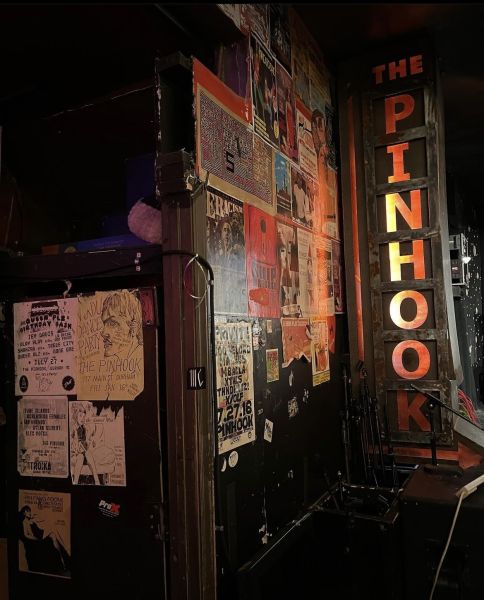
As a queer-led business, the Pinhook has been a community staple since its inception. Photo: The Pinhook
Prior to The Pinhook’s opening, Durham’s music-scene mostly moved in secret. There were speckles of house shows, pop-up venues and short-lived spaces (Joe and Jo’s, Mr. Shoe’s, Sirens, Broad St. Cafe, etc.) that were often named and renamed as steadily as bands formed and broke up. Audiences and musicians alike were hungry for shows and often they made do with whatever room, basement or backyard could host them. “There were house shows then because houses were more affordable back then,” notes The Pinhook’s owner Kym Register. Kym recalls the influence of local squats, some of which hosted shows, such as the Stronghold, The Couch House, The Layabout. In the late 90s and early 2000s, squats, house shows and warehouse spaces were pivotal to the punk scene. There was a touring circuit that moved exclusively through these D.I.Y. spaces in the South and the exchange that took place in these spaces resonated into what the Pinhook would later become.
The Pinhook was founded by Kym Register, Elizabeth Albrecht and Nick Williams, in the wake of the closure of Bull City Headquarters, a venue and community space that was briefly open from 2007- 2008 and was operated by a collective that included Register and Chaz’s Bull City Records owner Chaz Martenstein. BCHQ hosted many local and touring bands such as the Mountain Goats, Des Ark, Why Are We Building Such a Big Ship?, Kimya Dawson and The Screaming Females. The space also provided a bike co-op, workshops, classes and hosted community meetings.
“BCHQ came together because we were all looking for something. Some people were focused on studio spaces while I booked hardcore and punk shows and then there was the bike co-op…. all of these things just came together.” Chaz Martenstein
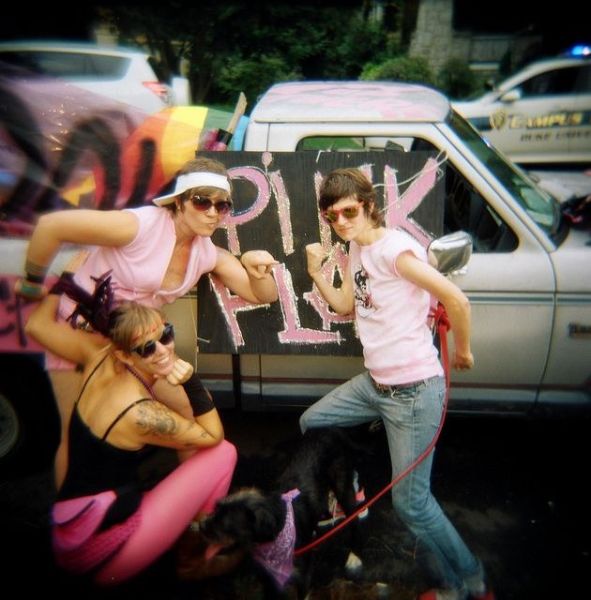
The individuals who came together to create The Pinhook wanted a community space where people could enjoy live music. Photo: The Pinhook
After BCHQ dissolved, Kym, Elizabeth and Nick began to set their sights on what would become The Pinhook. “We came here and worked for six months. We had eight pieces of plywood on little two by fours in the back for a stage” remembers Register. “As things started petering out at BCHQ, it was like, let's just move everything over here to The Pinhook” notes Martinstein. The Pinhook opened on election night of 2008. “It was huge. We ran out of everything,” recalls Register.
In the early years of The Pinhook, local and touring bands such as Hurray for the Riff Raff, Future Islands, Megafaun, Sylvan Esso, Big Freedia and many, many others played regularly before graduating to larger capacity venues. Yet many still returned to the venue, choosing to play The Pinhook’s room out of the sense of “home” that first established their appreciation of the Triangle and their connection to the community here.
Register is quick to point out that the Pinhook was not the first queer music venue on Main Street. That honor goes to Boxer’s Ringside Bar, a legendary institution for those who were lucky enough to experience it before its closure in 2007. Ringside was a four-story club and music venue famous for its labyrinth-like layout; on any given night a metal show might be on one floor while a dance party happened above. Throughout the venue there was a library, a cocktail-bar and dance floors and show spaces. It seemed purposely chaotic and to have no clear intended audience which captured Durham's amorphous and diverse interests.
Ringside was never presented as a gay bar, though it was the main queer hangout space in town at the time. In an article in The Indy from 2002, the club’s owner, Michael Penny said “I never wanted it to be exclusively anything.” Penny had once owned and operated Boxers, a gay bar which opened in 1989.
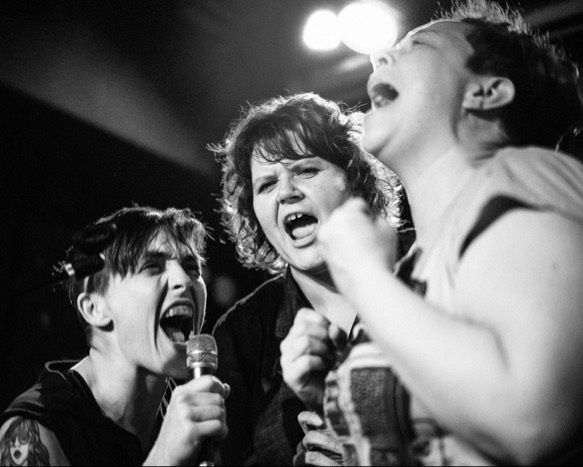
Legendary institution Boxer's Ringside Bar was the precursor to The Pinhook. Photo: The Pinhook
“I feel the importance of uplifting a historical connection to queer resistance and community spaces in Durham because I know that especially for young folks, it always feels like it's happening to you first and there's a loneliness in that, but just having these roots, and all of these people who've been here forever, fighting to make Durham a safe queer place, it is important to lift up those stories and histories.” Kym Register
The legacy of Durham’s queer music scene was well established by the time The Pinhook opened, in part due to bands like The Butchies, Des Ark, Robosapian, Bellafea (which featured H.C. McEntire) and Kym’s own band: Midtown Dickens. Record labels like Mr. Lady Records and 307 Knox helped to shine a light on local and national queer bands. Kaia Wilson of The Butchies and Tammy Rae Carland founded Mr. Lady Records while living in Durham and the label ran from 1996-2004, releasing music by national acts such as Le Tigre, Tara Jane O’Neil and Tracy and the Plastics. OutSmart magazine once called Mr. Lady Records “queercore’s strongest label.”
Throughout their time while running The Pinhook, Kym has always been active as a musician. They have been involved in many projects such as Midtown Dickens, DUNUMS and Kym's central songwriting project, Meltdown Rodeo. While touring, Kym has experienced many of the highs and lows of what a venue can offer, and this has framed their approach to shaping what The Pinhook has become.
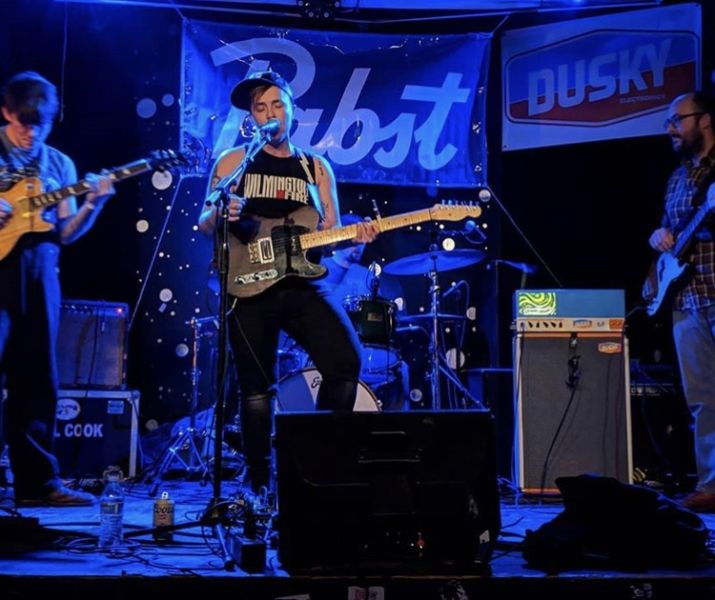
The Pinhook regularly hosts awesome bands for great shows. Photo: The Pinhook
“It's been the coolest thing to be able to offer space to people that I can trust and love. If a friend's band comes through, to have The Pinhook as a grounding point, has really changed the relationships I've been able to make on the road. I have a space to offer.” Kym is now the sole owner of the Pinhook but they are quick to note that this wouldn’t have been possible without the help of Nick and Elizabeth, a dedicated staff, angel investors and the greater community.
Between times of financial struggle and 2020’s lockdown, Durham’s community has rallied many times to help preserve The Pinhook. In 2016, a series of shows with undisclosed line ups were announced to pay off a surprise debt that almost ended the venue. Bands such as The Mountain Goats, Pipe, Sylvan Esso, Flock of Dimes, Mipso, Megafaun, Tiff Merrit and Hiss Golden Messenger all stepped forward and were able to raise enough money to pay off the debt. “No one knew who was playing but they wanted to support the bar and the shows all sold out which was amazing. Heather Anne was a really big part of it.”
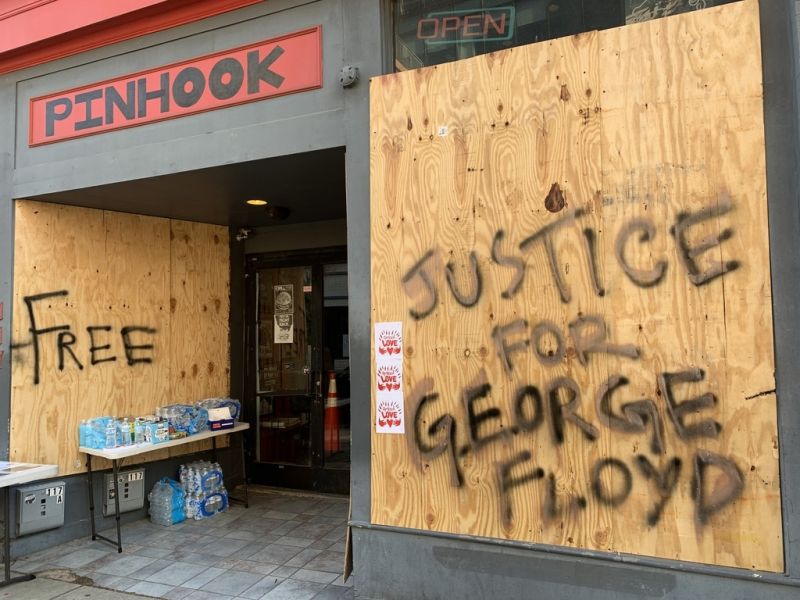
The Pinhook has always been a place that supports and is supported by the community. Photo: The Pinhook
Also in 2016, Kym wrote the song “Little River” which they recorded with their band Meltdown Rodeo. The song highlights an important episode of Durham’s queer history, which took place in 1981. “It was a very sad thing that happened. These straight men came and beat up this queer couple that were at this swimming hole called Little River. One of the men was just sunbathing naked on a rock and was killed. Michael Penny (who ran Ringside and Boxers) happened to be there and ran to the street, he hitched a ride and got someone to get help.”
Oh the swimming hole/oh the water knows/who was lost at little river
In 1981, 125 people gathered to denounce this violent attack and to ensure that justice was served for the murder of Ronald “Sonny” Antonevitch. This gathering was considered the first public demonstration for gay civil rights in North Carolina and was followed by a march on June 28th, 1986 led by the Triangle Lesbian and Gay Alliance on Duke University’s campus. This gathering became the first NC Pride March within the entirety of the state of North Carolina. One thousand people gathered to march from Ninth Street to the Durham Reservoir on Hillsborough Road. Their theme was “Out Today, Out to Stay.”
“That was what Pride in Durham was born out of. The protest is now a parade. And so, when I wrote a song about it, it became a way to spread this info and we got Michael Penny to be in the video and that started a relationship between us and it was very sweet. And now people have learned about that story through that song.” Kym Register
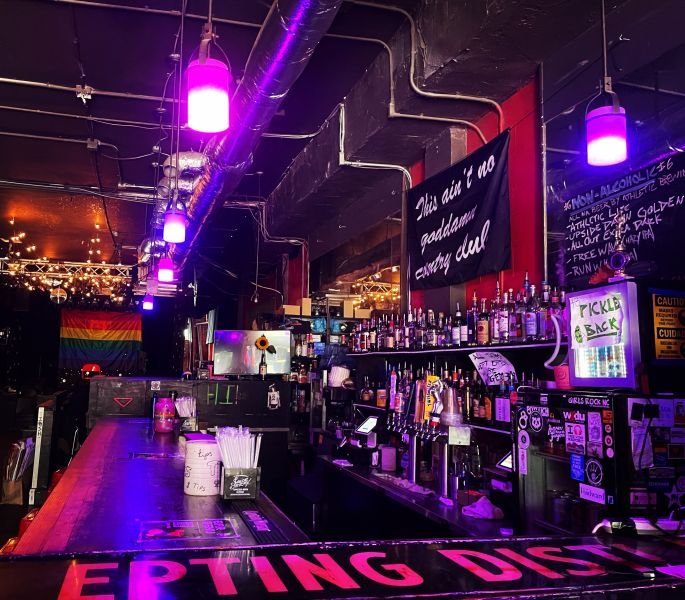
The bar at The Pinhook is an iconic community gathering space. Photo: The Pinhook
Today, what started as the first Pride march in North Carolina has become a three-day celebration that takes place each September. Pride: Durham, NC is a gathering of the LGBTQIA community and its allies; musical performances, pop-up markets, a parade and community gatherings take place at venues across Durham.
The Pinhook and Kym’s work as a musician, has embedded these two worlds of Durham’s rich queer and musical history, each which once thrived in secret. Durham now has many spaces where queer music and culture are shared and celebrated such as Arcana, Perfect Lovers and The Fruit.
The Music Lover's Guide to Durham
From intimate concert venues to historic halls and pop-up performances, Durham's live music scene has grown from its historic roots... Read More
LGBTQIA-Owned & Operated Businesses in Durham
Support these local LGBTQIA-owned businesses this month and the other eleven months of the year, too. Read More
Out and Wonderful: Durham Pride All Year Long
Durham is the most diverse, proud and vibrant destination in North Carolina. Read More